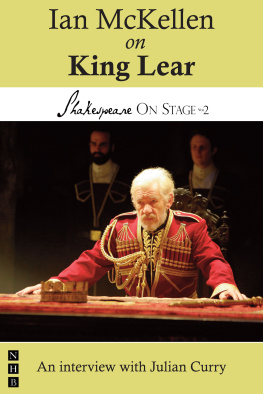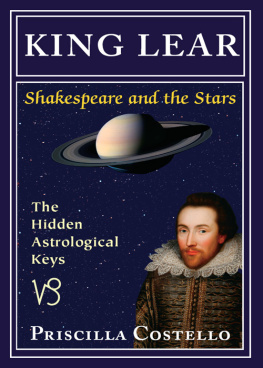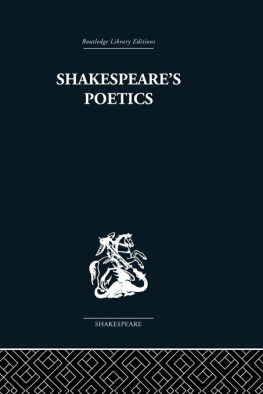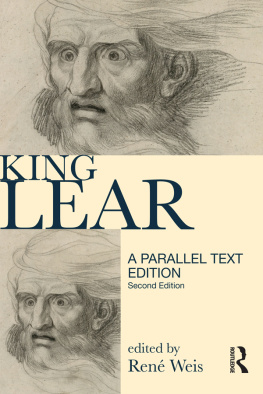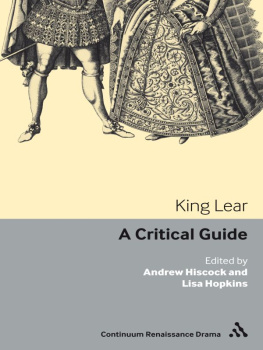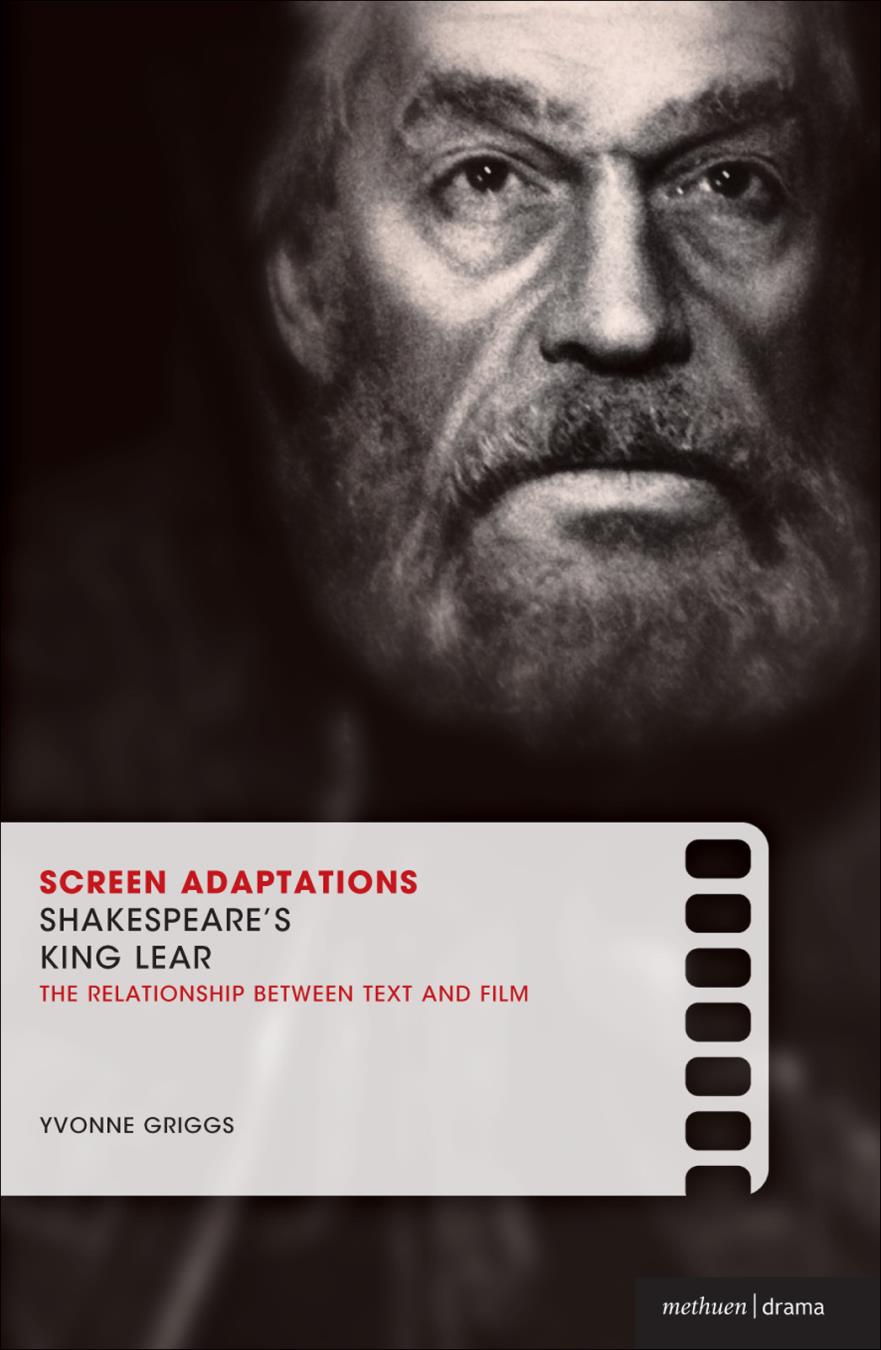
William Shakespeare, King Lear, The Arden Shakespeare, 3rd edition, ed. R.A. Foakes (London: Thomas Nelson & Sons, 1997). This edition has been consulted as it gives details of both Quarto (1608) and Folio (1623) texts; it indicates where passages appear in one text but not in the other, and thus provides the reader/ adapter with the opportunity to explore all performance possibilities. Unless stated, all further passages from King Lear are taken from this edition.
Richard Knowles, How Shakespeare Knew King Lear, in Shakespeare Survey: 55,King Lear and its Afterlife, edited by Peter Holland (Cambridge: Cambridge University Press, 2002), p. 14.
Ibid., p. 13.
Kiernan Ryan, King Lear: A Retrospective, 19802000, in Shakespeare Survey:55, King Lear and its Afterlife, edited by Peter Holland (Cambridge: Cambridge University Press, 2002), pp. 23.
Ibid., p. 3.
Stanley Wells and Gary Taylor, eds, The Complete Oxford Shakespeare (Oxford: Oxford University Press, 1986).
Allardyce Nicoll, Film and Theatre (London: Harrap & Company Ltd, 1936), pp. 23.
Peter Womack, Secularizing King Lear: Shakespeare, Tate and the Sacred, in Shakespeare Survey: 55, King Lear and its Afterlife, edited by Peter Holland (Cambridge: Cambridge University Press, 2002), p. 96.
A.C. Bradley, Shakespearean Tragedy: Lectures on Hamlet, Othello, King Learand Macbeth, 2nd edition (London: Macmillan, 1905).
G. Wilson Knight, The Wheel of Fire: Interpretations of Shakespearean Tragedy (London: Methuen, 1949).
Jan Kott, Shakespeare Our Contemporary (London: Routledge, 1967), p. 120.
Ryan, p. 1.
Ibid., p. 2.
Ibid., p. 7.
Copplia Kahn, The Absent Mother in King Lear, in Rewriting the Renaissance:the Discourses of Sexual Difference in Early Modern Europe, edited by Margaret W. Ferguson, Maureen Quilligan and Nancy Vickers (Chicago: University of Chicago Press, 1986), pp. 3349.
Kathleen McLuskie, The Patriarchal Bard: Feminist Criticism and Shakespeare: King Lear and Measure for Measure, in Political Shakespeare: New Essays inCultural Materialism, edited by Jonathan Dollimore and Alan Sinfield (Manchester: Manchester Univeristy Press, 1985), pp. 9099.
R.A. Foakes, Performance Theory and Textual Theory: A Retort Courteous, Shakespeare 2.1 (2006), p. 47.
Charles Marowitz, Recycling Shakespeare (London: Macmillan, 1991), p. 15.
Ibid., p. 9.
Robert Stam, Beyond Fidelity: The Dialogics of Adaptation, in Film Adaptation, edited by James Naremore (London: The Athlone Press, 2000), p. 66.
Linda Hutcheon, A Theory of Adaptation (New York & London: Routledge, 2006), pp. 89.
Douglas Lanier, Shakespeare and Modern Popular Culture (Oxford: Oxford University Press, 2002), p. 88.
Ibid., p. 85.
Geoffrey Wagner, The Novel and Cinema (Cranbury: Associated University Press, 1975); Dudley Andrew, Major Film Theories: An Introduction (London: Open University Press, 1976); Michael Klein and Gillian Parker, The English Novel and theMovies (New York: Frederick Ungar, 1981).
A range of alternative classifications are expounded in the works of these theorists: Kamilla Elliott, Rethinking the Novel/Film Debate (Cambridge: Cambridge University Press, 2007); John Desmond and Peter Hawkes, Adaptation: StudyingFilm and Literature (Boston, Ma: McGraw-Hill, 2006); Linda Costanzo Cahir, Literature into Film: Theory and Practical Approaches (Jefferson, NC: McFarland, 2006).
Thomas Leitch, Adaptation Studies at a Crossroads, Adaptation 1.1 (2008), p. 64.
Andr Bazin, Adaptation or the Cinema as Digest, in Film Adaptation, edited by James Naremore (London: The Athlone Press, 2000), p. 23.
Graham Holderness, Visual Shakespeare: Essays in Film and Television (Herts: University of Hertfordshire Press, 2002), p. x.
Imelda Whelehan, Adaptations: The Contemporary Dilemmas, in Adaptations:From Text to Screen, Screen to Text, edited by Deborah Cartmell and Imelda Whelehan (London and New York: Routledge, 1999), p. 18.
Deborah Cartmell and Imelda Whelehan, Introduction Literature on Screen: a Synoptic View, in The Cambridge Companion to Literature on Screen, edited by Deborah Cartmell and Imelda Whelehan (Cambridge: Cambridge University Press, 2007), p. 3.
Emma French, Selling Shakespeare to Hollywood: The Marketing of FilmedShakespeare Adaptations from 1989 to the New Millennium (Herts: Hertfordshire Press, 2006).
Holderness, p. 70.
Ibid., pp. 6970.
Ibid., p. 69.
Anthony Davies, Filming Shakespeares Plays: The Adaptations of Olivier, Welles,Brook and Kurosawa (Cambridge: Cambridge University Press, 1990).
Elsie Walker, Getting Back to Shakespeare: Whose Film is it Anyway? in A ConciseCompanion to Shakespeare on Screen, edited by Diana E. Henderson (Malden, Oxford, Victoria: Blackwell Publishing, 2006), p. 13.
Harry Keyishian, Shakespeare and the Genre Movie: The Case of Hamlet, in The Cambridge Guide to Shakespeare on Film, edited by Russell Jackson (Cambridge: Cambridge University Press, 2000), pp. 7381.
Courtney Lehmann, Shakespeare Remains: Theatre to Film, Early Modern toPostmodern (Ithaca and London: Cornell University, 2002), p. 235.
Deborah Cartmell, Film as the New Shakespeare and Film on Shakespeare: Reversing the Shakespeare/Film Trajectory, Literature Compass 3.5 (2006), p. 1152.
Daniel Rosenthal, The Bard on Screen, The Guardian, 7 April, 2007.
Kenneth Rothwell, A History of Shakespeare on Screen: A Century of Film andTelevision, 2nd edition (Cambridge: Cambridge University Press, 2004), pp. 47.
Douglas Lanier, Shakespeare and Cultural Studies: An Overview, Shakespeare 2.1 (2006), pp. 228248.
Neil Sinyard, Filming Literature: The Art of Screen Adaptation (London: Croom Helm, 1986), pp.1819.
Michael Anderegg, Welles/Shakespeare/Film: An Overview, in Film Adaptation, edited by James Naremore (London: The Athlone Press, 2000), p. 161.
Ibid., p. 162.
Ibid., p. 161.
Franco Zeffirellis realist versions of The Taming of the Shrew (1966) and Romeoand Juliet (1968), Tony Richardsons Hamlet (1969), Stuart Burges Julius Caesar (1970), and Roman Polanskis Macbeth (1971) remain period pieces which conform to the expected conventions of film practice in a way that Brooks film does not.
Brook directed Lord of the Flies (1963), Marat/Sade (1967), and Tell Me Lies (1968).
Robert Murphy, Sixties British Cinema (London: BFI, 1992), p. 4.
In the eighties Cannon produced Texas Chainsaw Massacre II (1986), SupermanIV: Quest for Peace (1987), and The Barbarians (1987).
Dogme Manifesto, Dogme95. Online: www.dogme95
Roger Ebert, A Thousand Acres, review, Chicago Sun-Times, 19 September, 1997.
Lanier, Shakespeare, pp. 228248.
Ethan Hawkes Hamlet is a media-savvy loner; Julia Stiles Ophelia embodies teen audience appeal through her performances in teen Shakespeares (TenThings I Hate About You, 1999, and O, 2001).
Leo Braudy, Film Genres in


